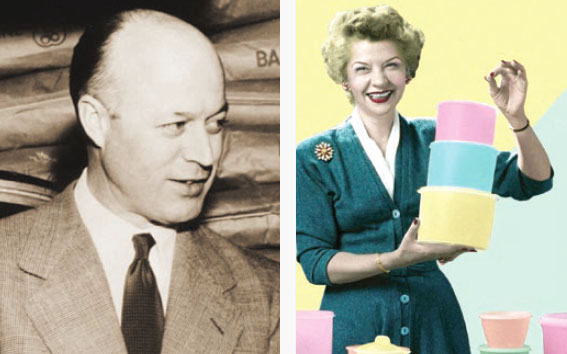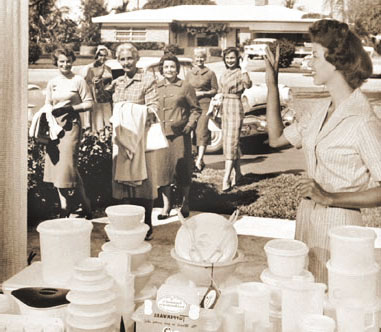Craze Gone Crazy - Page 5
 |
|
|
Plastic with a Burp
Many women of the mid-century discovered they could generate a significant income from plastic bowls that burped like babies.
'Tupperware ladies' percolated in living rooms along with their coffee machines, selling the convenience and efficiency of their storage containers to family members, neighbors, and friends.
Tupperware was the brainchild of businessman Earl Tupper. By the early 1940s, he had figured out a way to turn this industrial byproduct into an improvement on plastic.
Early on, nobody understood what Tupperware was or how to use it. Housewives were wary of this peculiar new product. After all, it looked nothing like the plasticware found in most kitchens of the era, and it had an off-putting smell, an oily texture, and seemingly cheap construction.
The bowls' most unique feature was what held it back: the airtight lids wouldn't seal unless they were 'burped' beforehand, and that confused the average consumer. In fact, buyers would often return lids claiming they didn't fit.
Burping containers was something people had to master. The problem was, most of them wanted something easy-breezy. Tupper realized he needed a new sales strategy, and quick.
Around the same time, a cleaning products company named Stanley Home debuted the 'home party'—a new sales method. Stanley Home parties were a chance for women to buy products from salespeople inside the comfort of their living rooms or kitchens, and to do so with their friends and neighbors present.
 |
One of Stanley Home's salespeople, Brownie Wise, quickly saw the potential of this method to sell more than just cleaning products. She formed her own business, Patio Parties, and began using the informal get-together model in homes to sell numerous household goods.
Tupper, who was aware of the success of the Stanley Home's model, decided to hire Wise as his general sales manager in 1951. It would take this one go-getter with a whimsical name, and a posse of amateur salespeople, to sell these modern containers to America.
Soon, 'Tupperware parties' became the only way to purchase Tupper's polyethylene plastic containers.
Wise turned out to be a bit of a genius in this new way of marketing products. She had an intuitive understanding of how to motivate others and became a role model for thousands of other women.
Wise proved that Tupperware could be sold if it was shown correctly and the learning curve was presented in an entertaining and socially engaging way.
Wise's at-home demos were amusing and frenzied in all the right ways. She'd toss the plastic containers across the room to show that they wouldn't break, and get guests giggling as they played party games that educated them about the product.
Wise was also a PR dynamo. As the company grew along with her success, she was quoted by newspapers and invited to talk shows. She was also pictured on covers of magazines, becoming the first woman to land that spot in Business Week.
But over time, Tupper grew jealous of Wise's success and ease in the public. He abruptly fired her in 1958, but his multi-million-dollar company and Tupperware parties lived on—along with that trademark burp.




